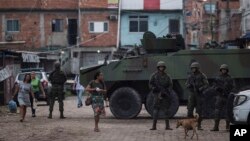Brazil's lower house approved a decree to put the military in charge of Rio de Janeiro's security forces early Tuesday as soldiers and police spread out throughout in the city to combat rising crime.
The military took over Rio's police on Friday, but the presidential decree still needs congressional approval. The Chamber of Deputies has sent the measure to the Senate, which was scheduled to debate it later in the day.
Overnight, the armed forces and police spread out in in Rio in the first major operation since the change in command. They took up positions on major roads that connect Rio with the rest of the country in an effort to prevent drugs, illegal arms and stolen goods from entering the city, said Col. Roberto Itamar, a military spokesman. Around 3,000 members of the armed forces were involved.
Armored vehicles rolled through the streets of one neighborhood on Guanabara Bay on Tuesday, while boats patrolled the waters. Soldiers and police set up checkpoints and searched everyone leaving or entering during the morning commute.
The operation was planned before the new military commander took over, and he has yet to lay out his plan for tackling the wave of violence in Rio. Security in Rio has been deteriorating for at least two years as the state experiences a deep fiscal crisis.
Itamar said the military intervention would go beyond the mere use of soldiers in the streets.
"The population will see an improvement in the actions of the institutions that are constitutionally responsible for public security in Rio de Janeiro," he said in an interview with The Associated Press.
The decree has caused unease in Brazil, where many still remember the 1964-1985 military regime, and has raised concerns that the heavy-handed tactics that police have used in the past will increase.





